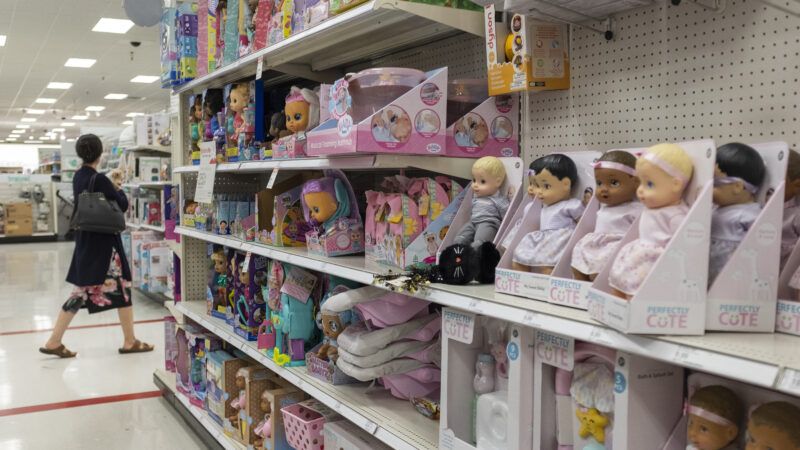Trump Is Wrong. Cheap Goods Are Awesome.
The right number of dolls? As many as your kid wants.

Donald Trump doesn't think Americans deserve stuff. The right number of pencils for a family? Five. The right number of dolls for a little girl? Two, maybe three. His comments in recent interviews bear a striking similarity to those of left-wing Sen. Bernie Sanders (I–Vt.), who in 2015 famously bemoaned that consumers have too many deodorant options.
How did Trump—who campaigned on a promise of reducing inflation—become so eager to have Americans pay more for everyday commodities? While Trump may have made overtures to reducing prices, he's long supported the kinds of economic interventions most likely to lead to inflation. And if you believe that protectionism is the path to prosperity for everyday Americans, your definition of prosperity starts to change pretty quickly.
Just a few months into his second term, Trump has so far enacted a sweeping protectionist agenda. He's levied staggering tariffs that have hiked prices on everything from mattresses to cars to strollers and tanked the stock market. However, Trump and his defenders have remained strident, arguing that Americans just don't need affordable imported goods.
Tariff defenders on the left and right seem to think this way—and don't hesitate to frame these goods as somehow antithetical to a healthy society. In April, one conservative commenter went viral after he posted a photo of a dingy, cramped living room with the caption "Remember what they took from you." Earlier this month, X was dominated by AI-generated images of 1950s-style family scenes with captions like, "We traded this for a higher GDP," as if happy families are somehow incompatible with economic growth. In January, one House Democrat voiced support for tariffs, questioning whether Americans even need avocados.
These tariff enthusiasts are wrong. Cheap goods aren't at odds with prosperity—they're one of the main ways we experience economic flourishing. Having the ability to try new hobbies, to cost-effectively furnish a home or stock a fridge, are key parts of what makes us feel like we're economically thriving. Looking at my own recent Amazon history, it's easy to see how globally traded, inexpensive goods made my life better and more convenient. There's the peeler (made in China) that helps make elaborate citrus curls for cocktails. There's the face wash (France) and a new purse (China). There's even a pack of Canada-made cow-free dairy milk (yes, this exists) that my vegan, protein-obsessed husband bought with delight.
Other Americans also seem to prefer low prices over other factors. Last month, a showerhead company decided to offer customers the ability to pay significantly more for a product made in America. While the company sold 584 of their Asian-made showerheads, they sold zero American-made showerheads, even though around a third of Americans claimed in a recent survey that they'd pay more, regardless of the price difference, for an American-made product.
The good news for global trade–enthusiasts is that while the premise of high tariffs is to bring manufacturing back to America, not many Americans actually want to work in factories. A 2024 survey from the Cato Institute found that while 80 percent of Americans believed that our country would be better off if more people worked in manufacturing, only around 25 percent said they would personally be better off if they worked in a factory. And there's reason to doubt how fervent that 25 percent is, too. "Around the same share of homemakers, students, and permanently disabled respondents expressed a preference for factory work as did full-time workers—a clear indication that said preference isn't real or, at least, very strong," Cato's Scott Lincicome wrote last month. Our nostalgia for our poorer, more manufacturing-centric past, it turns out, is based on little more than vibes.
"High-enough tariffs might be able to reshore labor intensive industries like textiles (at a massive cost, of course), but—because there's no vast surplus of available, eager labor—doing so would inevitably come from shifting finite resources away from the higher-value activities in which our workforce specializes today," Lincicome added. "Put another way, we'll be gaining mediocre jobs nobody really wants at the expense of better jobs they actually do."


Show Comments (109)